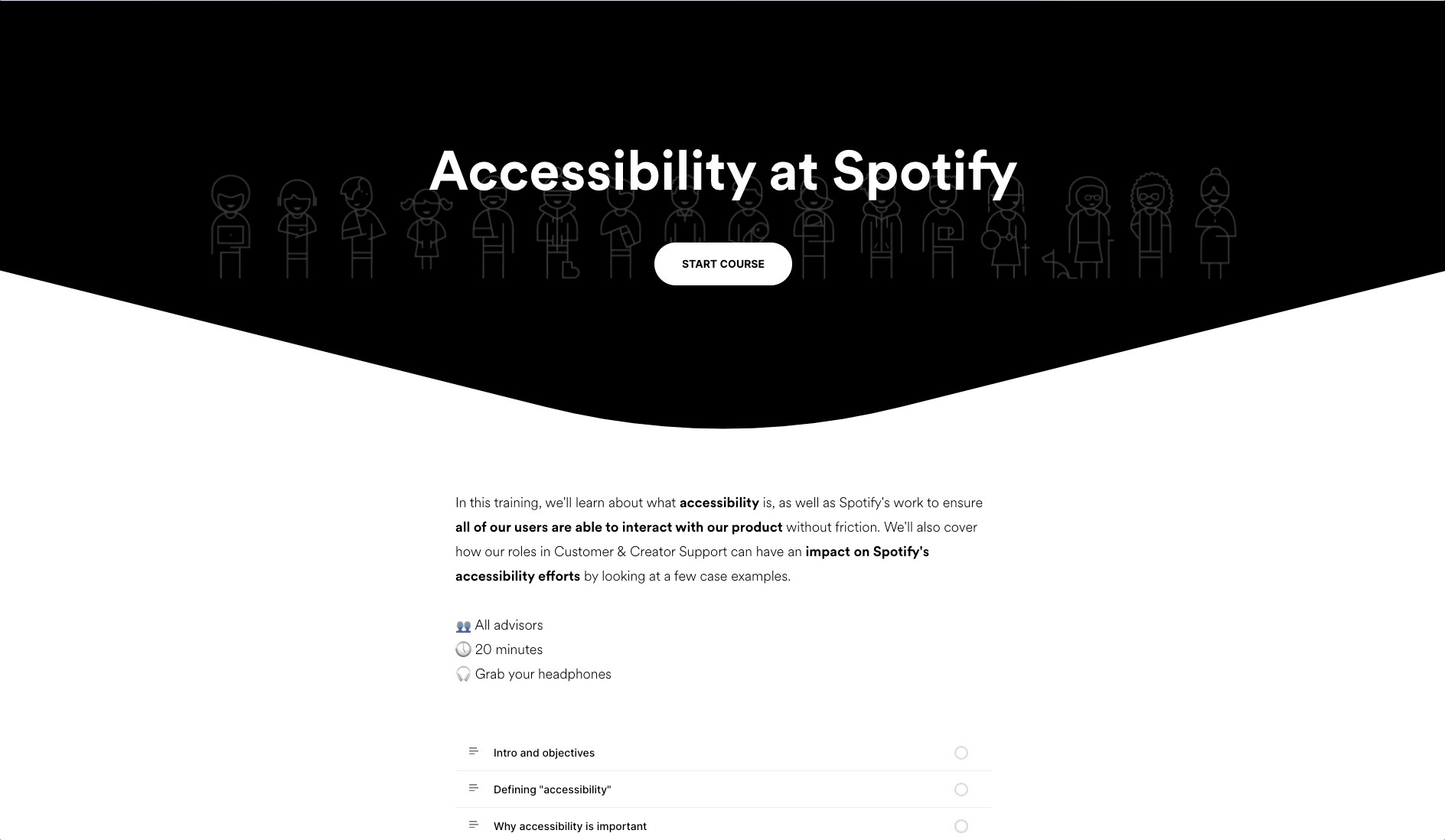Accessibility at Spotify
Role: Instructional Designer
Timeline: 3 months
Tools: Articulate 360, Final Cut Pro X, Google Workspace
Stakeholders: Accessibility Bet Project Manager, Partner Management, CS Social Leadership, CS Training, CS Advisors
Problem: Advisors didn’t know how to identify or escalate support cases related to accessibility, resulting in a poor customer experience. We also wanted to give them a foundational understanding of accessibility.
Outcome: I delivered a 20-minute eLearning module that met the following objectives:
Defined what accessibility is and why it's important to Spotify
Demonstrated the differences between permanent, temporary, and situational disabilities
Presented real-world accessibility issues and referenced channel-specific support processes
Prep
The company was putting a focus on making the platform more accessible to creators and users alike. For the customer service side, the focus was on educating our advisor base on the importance of identifying and escalating accessibility contacts.
I prepared this project plan:
Goal
To incorporate accessibility training into our various CS training programs to ensure advisors are equipped to assist users with all types of disabilities who may contact their channel.
Deliverables
Overall CS:
Uptraining eLearning for existing advisors
eLearning lesson
Video intro
Modules for Bassline training (the core new hire curriculum)
Deck to introduce with discussion topics
eLearning section for review
Individual Lines of Business (LOBs):
Email/Chat/Social/Creator:
Modules for handling cases related to accessibility
Milestones
Overall CS:
Uptraining eLearning for existing advisors
eLearning lesson
Outline delivered for review
eLearning is fleshed out and delivered for review
eLearning is rolled out to pilot group
eLearning is rolled out to existing CS advisors
Video intro
Storyboard is delivered for review
Script is delivered for review
First pass of video is complete
Final video is delivered and incorporated into eLearning and Bassline
Modules for Bassline training (core new hire curriculum)
Deck to introduce with discussion topics
Outline delivered for review
Deck is delivered
Train the Trainer is scheduled
Deck is rolled into New Hire
eLearning section for review
Outline delivered for review
eLearning is delivered
Individual Lines of Business (LOBs):
Email/Chat/Social/Creator:
Modules for handling cases related to accessibility
Syncs set up with channel leads to discuss what each curriculum needs
Outlines for each individual LOB’s plan are delivered
More TBD, will come after channel leads chats
I also tracked down existing resources so I wasn’t reinventing the wheel. I found a deck that had been created a few years prior for our Social support advisors:
While I couldn’t use the deck itself as the material due to the asynchronous nature of eLearning, it did help me in two ways:
It directed me me to Microsoft’s accessibility resources
It included examples of actual customer reports of inaccessibility
I wanted to build this interaction that took one accessible feature and applied it to three people in different circumstances. It was important that the block be low-bandwidth due to our advisor base working from home and having unreliable internet in certain locales.
Interactions
Meeting People Where They Are
I’m not always a subject matter expert in the content I create, but sometimes my interests line up perfectly! For this training, my first goal was to give an introduction to accessibility—and how even our able-bodied advisors benefit from universal design.
Training demo
What I’d do differently today
Our own images
We had the time and resources to create our own graphics for this project, but chose to use the existing Microsoft resources because of their simplicity. Today, I’d want to make these more Spotify.
Live case studies
As an example, this important GDPR email was widely reported by users for its too-light font color and weight.
Instead of explaining the “why,” as I did back then, I’d create an interaction to ensure the advisor can identify why this is an issue, who it’s an issue for, and how to solve the case.







